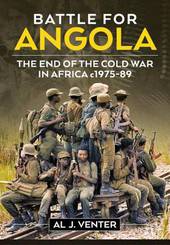
|
Battle for Angola: The End of the Cold War in Africa c 1975-89
Hardback
Main Details
| Title |
Battle for Angola: The End of the Cold War in Africa c 1975-89
|
| Authors and Contributors |
By (author) Al J. Venter
|
| Physical Properties |
| Format:Hardback | | Pages:564 | | Dimensions(mm): Height 245,Width 170 |
|
| Category/Genre | African history |
|---|
| ISBN/Barcode |
9781911096412
|
| Classifications | Dewey:967.303 |
|---|
| Audience | |
|---|
| Illustrations |
200 b/w photos, two 16pp colour sections
|
|
Publishing Details |
| Publisher |
Helion & Company
|
| Imprint |
Helion & Company
|
| Publication Date |
15 February 2017 |
| Publication Country |
United Kingdom
|
Description
Following the publication of Al Venter's successful Portugal's Guerrilla Wars in Africa - shortlisted by the New York Military Affairs Symposium's 'Arthur Goodzeit Book Award for 2013' - his Battle for Angola delves still further into the troubled history of this former Portuguese African colony. This is a completely fresh work running to almost 600 pages including 32 pages of colour photos, with the main thrust on events before and after the civil war that followed Lisbon's over-hasty departure back to the metropole. There are also several sections that detail the role of South African mercenaries in defeating the rebel leader Dr Jonas Savimbi (considered by some as the most accomplished guerrilla leader to emerge in Africa in the past century). There are many chapters that deal with Pretoria's reaction to the deteriorating political and military situation in Angola, the role of the Soviets and mercenaries in the political transition, as well as the civil war that followed. With the assistance of several notable military authorities he elaborates in considerable detail on South Africa's 23-year Border War, from the first guerrilla incursions to the last. In this regard he received solid help from the former the head of 4 Reconnaissance Regiment, Colonel Douw Steyn, who details several cross-border Recce strikes, including the sinking by frogmen of two Soviet ships and a Cuban freighter in an Angolan deepwater port. Throughout, the author was helped by a variety of notable authorities, including the French historian Dr Rene Pelissier and the American academic and former naval aviator Dr John (Jack) Cann. With their assistance, he covers several ancillary uprisings and invasions, including the Herero revolt of the early 20th century; the equally-troubled Ovambo insurrection, as well as the invasion of Angola by the Imperial German Army in the First World War. Former deputy head of the South African Army Major General Roland de Vries played a seminal role. It was he - dubbed `South Africa's Rommel' by his fellow commanders - who successfully nurtured the concept of `mobile warfare' where, in a succession of armoured onslaughts `thin-skinned' Ratel Infantry Fighting Vehicles tackled Soviet main battle tanks and thrashed them. There is a major section on South African Airborne - the `Parabats' -by Brigadier-General McGill Alexander, one of the architects of that kind of warfare under Third World conditions. Finally, the role of Cuban Revolutionary Army receives the attention it deserves: officially there were almost 50,000 Cuban troops deployed in the Angolan war, though subsequent disclosures in Havana suggest that the final total was much higher.
Author Biography
British national Al Venter has written more than a dozen books on recent military history including "War Dog: Fighting Other People's Wars" on mercenaries as well as "Gunship Ace" (which covers the exploits of Neall Ellis, the world's most famous mercenary aviator). He spent much of his professional career reporting on wars for Jane's Information Group as well as for various news and photo agencies. These assignments ranged from visiting Beirut several times to cover the Lebanese civil war from the Christian side to a spate of African conflicts that included Biafra, South Africa's border wars, the Rhodesia insurgency, the Congo, Tanzania's invasion of Idi Amin's Uganda, Executive Outcomes mercenary operations in Angola and Sierra Leone and others. He was operational in El Salvador's guerrilla struggle and later, in the Balkans. At the behest of the CIA, he made a one-hour TV documentary on the Soviet offensive in Afghanistan in the mid-1980s. Venter has written three books on nuclear proliferation, including Iran's Nuclear Option and How South Africa Built Six Atom Bombs. He originally qualified as a Fellow of the Institute of Chartered Shipbrokers at the Baltic Exchange in London.
ReviewsBattle for Angola: The end of the Cold War in Africa c1975-1989 is an insightful read, especially for someone looking for a broad view of the Angolan theatre of war for the period mentioned. The text is elucidated with a number of excellent photographs, spanning the whole period reported on. The broad glossary makes it easier for those not familiar with the necessary military or political terms while the comprehensive index makes it useful for those interested in further research on the topic covered. * Insight on Africa * Something of a tour de force...a must read for those interested in this period." Winner of the 'Miniature Wargames Recommends' award for July 2017. * Miniature Wargames - Paul Jackson * ...breaks down the complex political and military situations in to language which the Common Man on the Clapham Omnibus can understand .Without a doubt this will be the leading reference on the proxy cold wars fought in Africa and will be a best seller. 5 stars. * Army Rumour Service * War, famine, terrorism etc., have ravaged most of the countries of central and southern Africa and this book, about the 1970s-1980s, describes a conflict that brings a feeling of dismay and sadness as the people of Angola fall into the misery and self-destruction of a civil war. * Books Monthly *
|